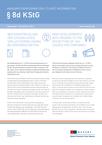
New developments with regard to the offsetting of taxlosses for companies
The key provision regarding the use of losses by companies (in particular the German legal forms AG and GmbH) is currently sec. 8c of the German Corporate Income Tax Act (KStG). Under this provision the unused loss is forfeited proportionally if, within a five year period, shares of more than 25 % but less than 50 % of the relevant company are transferred to one purchaser. The loss is forfeited in its entirety if, within a period of five years more than 50 % of the shares of a company are transferred to one purchaser. Exceptions are included in the “Hidden-Reserve- Clause” and the “Group Clause”.
In practice the unrestricted forfeiture of losses has often proven to be investment preventing. This problem has now been addressed by the legislature, at least in part, in the new sec. 8d KStG. The aim of the regulation is the elimination of unconditional forfeiture of losses in the case of new entrance or change of shareholders.
With sec. 8d KStG companies have the possibility to retain their losses for future offset in spite of a basically harmful transfer of shares. The essential prerequisite for the application of sec. 8d KStG is that the company whose shares are being transferred (prejudicial acquisition of shares) maintains exclusively the same business activity in the future as in the past. The benefits of the new regulation must be applied for.
Business activity in the sense of sec. 8d KStG-draft is the consistent intention of making profits and the sustainable, specific but complementary, and supporting activities of the company. A different business activity would be assumed under the draft act if different products or services are offered by the company, the group of customers and suppliers has been changed, different markets are served or the skills profile of the employees changes.
“Business activity” is a new tax definition and, as so often with new legal terms, will result in disputes with the tax offices. The use of the term “exclusively” in the wording of the law creates a very narrow definition of the business activity and leaves little room for interpretation.
Sec. 8d KStG-draft does not apply if not the same business activity is being continued or comparable acts occur. Comparable acts occur if:
- the business activity is laid dormant,
- the business activity is redirected to a different purpose,
- an additional business activity is incorporated,
- the company acquires an interest in a partnership,
- the company takes on the status of head of a tax group in the meaning of sec. 14 para. 1 KStG or
- assets are transferred to the company for a value below the estimated fair market value.
To avoid misuse none of the mentioned events may have occurred within a period of three assessment periods prior to the prejudicial acquisition. Furthermore the losses must not originate in the time before cession or setting dormant of the business activities and the company may not during the above mentioned time period, take on the status of head of a tax group or acquire an interest in a partnership.
Should the requirements for the continuation of the loss carry forward be fulfilled a “continuation-linked losses” will be separately assessed and is to be used prior to the regular loss carry forward.
Example
- Tax losses end of 01 € 1.2 m
- Transfer 100 % of shares in 02, same business activities; the loss carry forward will be assessed at the end of 02 as “continuation-linked losses” of € 1.2 m.
- Losses in 03 of € 0.5 m; assessment of “continuation-linked losses” of € 1.2 m and “regular” losses, in accordance with sec. 10d para. 4 EStG, of € 0.5 m
- Profit in 04 of € 0.3 m: setting of first against “continuation- linked losses” and assessment of € 0.9 m “continuation-linked losses” in 04 and assessment of regular losses, in accordance with sec. 10d para. 4 EStG, of € 0.5 m
The “continuation-linked losses” cease to exist as soon as one of the above mentioned events occurs. However, the “continuation- linked losses” are maintained in the amount of hidden reserves exist.
The law takes retroactive effect to 1 January 2016, if the business activity of the company has neither been adjusted nor laid dormant before the stated effective date. The transfers of shares already made in 2016 are thereby included and it needs to be determined whether the planned new regulation is applicable.
With this law the legislator chose to improve rather than to deliberate on the correctness of the unconditional forfeiture of losses in the case of a change of shareholders. It is worth to mention that sec. 8c KStG has been brought before the German Constitutional Court to assess its compatibility with the constitution. The regulation of sec. 8d KStG is reminiscent of the antecedent regulation to sec. 8c KStG, specifically sec. 8 para. 4 KStG, which, due to considerable difficulties in the distinction between prerequisites and its practical applicability, was ultimately dropped. The planned regulation threatens similar distinction difficulties. The very narrow prerequisite that “exclusively the same business activities” are to be carried out, impedes, in our opinion, further sensible restructuring, for example, through ceasing or taking up partial business activities, and only contingently serves the goal of removing tax obstacles to capital procurement.
According to the explanatory memorandum the new regulation should have no direct references to EU law. In our understanding this implies that the legislature sees no risk of illegal state aid under EU law in sec. 8d KStG. Whether this assessment is true, remains to be seen.


